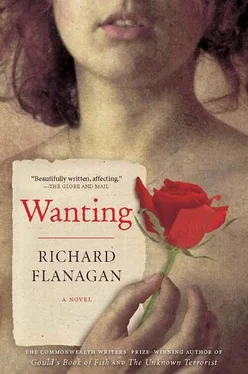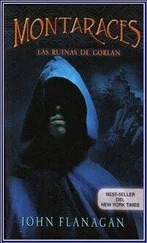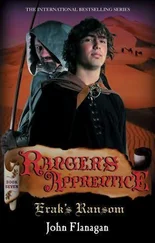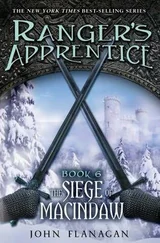He dosed himself more frequently with laudanum. Those who objected that Little Dorrit was his gloomiest novel got no argument from him. It was also his most successful, its sales in serial form exceeding all his previous works. He was so alone. He resolved to endure. He would sacrifice all. He could not bear to talk to his wife. He was forty-five. He and Catherine no longer recognised each other, no longer could apprehend in the other pain, sorrow, regret. He could feel something breaking.
Was it the world? Was it him? He had been drawing on something within to keep writing his books, to play Dickens, and it was some reserve he no longer had. His soul was corroding. Certain blows rained down on him, all the more incomprehensible and unsayable because of his external success. It was a slow loss of life, or vitality, or somesuch, some force that joined him with others, and it was that joining with others that he found harder and harder. It was as if the more of him there were in his books, the less of him in life. He might have spoken about it if he knew anyone who might have understood, but, not understanding it himself, that was impossible. He was falling and falling and he did not know how to stop.
Winter gave way to spring. He finally bought Gad’s Hill, the home in Kent he had dreamt of owning since, as a child, he walked past it with his father. He remembered himself as a queer small boy listening intently as his father told him that, if he were very persevering and worked very hard, he might some day come to own it. He had persevered. He had worked hard. He had talent—some said genius. He had Gad’s Hill as proof. It should have felt an affirmation. It didn’t.
Genius—what was it? Increasingly it felt an agony. Yet only in his work did Dickens truly feel that he became himself, only as he took on the mask of this and that character did he discover the very truth of who he was. His novels were true in a way life was not. Why, even Katy had accused him that his characters in his novels were more real and dear to him than his children. He denied it, he laughed it off, he resented it. He moved his family to Gad’s Hill, but he remained most nights in London, sleeping in a small suite he kept above the Household Words office. He feared his work was eating up his soul. Talent, genius—were these just names for his determination to continue excavating himself until only a corpse remained to offer death?
He looked in the large mirror he had hung opposite his desk to observe his own face as it played out the part of this character or that. But all he saw was a face that could have been any man and no man, somebody who in his relentless mimicry of everybody had become nobody. He had met most of the great men of his age and been invariably disappointed. I have no peer, he thought. How he missed Richard Wardour!
The rain pattered down erratically, as if troubled by some guilty secret; the city through which he was once more nightwalking was a hundred heavy shades of pewter. Yet it was the only real home he had, wandering those foul rookeries and casual wards, mazes of misery with their half-naked inhabitants and oilskin doors and broken windows, the wretched courtyard where a wraith-like woman drooled as she sucked opium from a rude pipe contrived from a penny ink bottle. Above, he saw the wild moon and clouds rolling restless as an evil conscience in a tumbled bed. Finally light staggered down into the streets of the Great Oven. He made it back to his rooms an hour after dawn.
He went straight to his desk. He felt his thoughts start stuttering and then words spat and fizzed, and one word led to another and then that in turn led more along. In this way, he knew, wars, revolutions, conspiracies, love affairs and novels were made, but nothing could empty Dickens’ head of something beyond words: it was fit to burst with everything that could never be said.
‘ The wind is rushing after us, and the clouds are flying after us, and the moon is plunging after us, and the wholly wild night is in pursuit of us ,’ he found himself writing in his notebook; ‘ but so far we are pursued by nothing else .’
It made no sense. Why was the night in pursuit? And who was us and we ? Who would walk with him?
The strange journey to where Dickens would find us and we began a week later when he travelled by railway from Gad’s Hill up to London. A man with a collapsing Stilton for a head entered Dickens’ carriage. He sat down, opened a newspaper, then almost as soon as it was fanned out, folded it back up and turned to the passenger next to him. He spoke as though reporting an advertisement for chamber pots.
‘Douglas Jerrold is dead.’
Dickens was stunned. Why, he had seen his good friend only the week before, and though Jerrold had said he had been sick, he had put it down to the inhaling of fresh paint from his study window.
It had been a wretched enough morning already. Katy had bought a bonnet and Catherine had felt it perfectly fine. He liked seeing his daughters look as splendid as she did in the bonnet, but the cost! the cost! His children had no idea about money—they were as spendthrift as his own father had been, and, he feared, perhaps as doomed.
He had shouted at Katy, who had shouted back, and then Catherine shouted, then it seemed that there could be nothing said unless it was by shouting. Then he had stopped and in a whisper begged for them all to stop, to stop such madness as this, to stop falling apart, to come together once more as a family. But it was a speech, words, and no one cared a fig for it, and Catherine was weeping again and Katy was standing at her side, glowering at him.
All he could do was try to steady himself by returning to work, to some new project in which he might once more bury himself alive. But Little Dorrit was done, the last instalment at the printer, and he had no project before him other than Household Words .
By the time Dickens saw Wilkie at the Household Words office, his thinking had made several leaps. Knowing there was no private income in Jerrold’s family, Dickens proposed to Wilkie that they stage some benefit performances of The Frozen Deep for the widow and her children. After all, its initial run of just four performances had caught the attention of London, and had not he and Wilkie both been met frequently with requests to reprise the play from every section of society, up to and including the Queen herself?
And so it was that on the fourth of July, a command performance of The Frozen Deep was given at a new, larger venue—the Royal Gallery of Illustration—for Queen Victoria, Prince Albert and their family; among the other guests were King Leopold I of Belgium, Prince Frederick William of Prussia, and his fiancée, Princess Victoria, and even such luminaries as Hans Christian Andersen. This was followed by three additional performances at the same venue over the next few weeks. Dickens was once more Wardour, and his performance an even greater sensation.
‘If that man would go upon the stage,’ exclaimed Thackeray in the foyer afterwards, ‘he would make £20,000 a year!’
But for all the success The Frozen Deep enjoyed, despite the expensive ticket prices, insufficient funds were raised to sustain Mrs Jerrold. Dickens, emboldened by his success, his spirits raised by once more playing Wardour, decided to stage a further series of performances in a much larger venue that would hold an audience big enough to raise the money needed. He settled on the Manchester Free Trade Hall, a magnificent new building which could seat two thousand people.
If the size solved one problem, it created another. Dickens became convinced that his amateur actresses would not be able to project their voices sufficiently loudly and dramatically in such a cavernous theatre. Engaging and charming as his daughters and servants were in a small space, where their dramatic failings somehow created a kind of domestic charm, in a great theatre he feared that they would simply be viewed as mediocre, even ludicrous. He would need to find professional actresses.
Читать дальше












